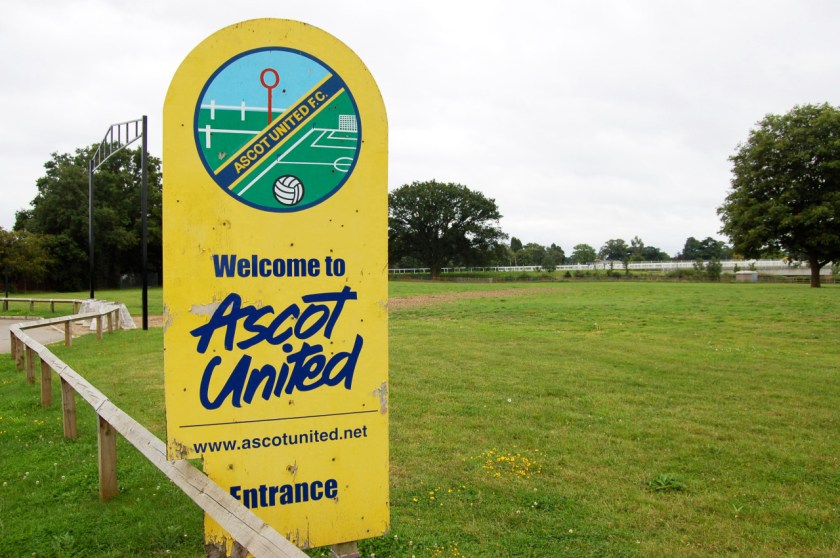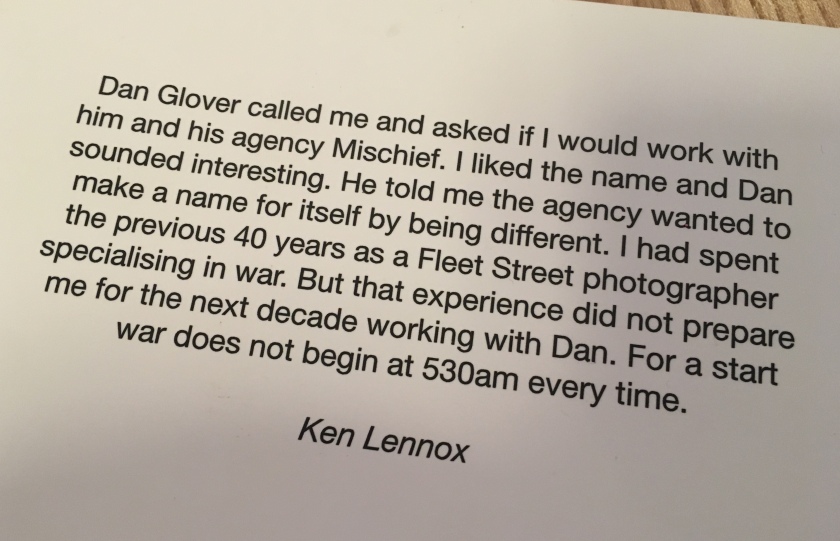I’ve been clearing out a load of stuff recently and came across a book Mischief staff made me when I left the agency just over four years ago. I read it at the time, but had never really read it again as I’ve always been hyper conscious of not becoming too self-indulgent and, in all honesty, I’m not so good with compliments (a leaving book is full of nice words, not necessarily honest words!). Anyway, I thought I’d re-read it and see if I could learn anything from it.
One word that kept cropping up more than most was “determined”. And I’m pretty pleased that people thought/think that of me because deep down I know I’m not a “creative genius”, but I do know that when I have an idea, I have it within me to not stop until that idea is realised. Being determined with creative work does not necessarily make you popular because it usually means you’re always pushing yourself and others outside of the comfort zone. And the comfort zone is, well, comfortable. An agency can make nice work and a fair amount of money in the comfort zone. But the comfort zone is not really for me. Indeed, I like doing work that makes me slightly uncomfortable (as in, “can we really pull this off” uncomfortable), which has become an unofficial principle during my career, and one I hope I never lose.
Bill Bernbach, who should be everyone’s creative hero, said that “a principle isn’t a principle until it costs you something”, and this was (very nearly) the case when we pitched an idea to Budweiser to mark its sponsorship of The FA Cup way back in 2011. The global beer brand had announced its sponsorship of the very domestic FA Cup and received a bit of a backlash due to its US heritage (i.e. “what do the Yanks know about football?” type stuff) and the fact it’s a booze brand. I thought The FA and the Budweiser global team could have handled the original announcement a bit better, but we were where we were and an emergency meeting was called for the domestic agencies to now figure out how now to strategically position the sponsorship and to start working up an activation plan.

We worked really well as an all-agency team and quickly came to what I think is still a brilliant positioning/promise/purpose that Budweiser would use its global reach to “Open up the magic of The FA Cup to football fans around the world”. “Open up” was a subtle reference to beer, “magic of The FA Cup” was the David v Goliath-anything-can-happen stories the tournament generated, and “to football fans around the world” was serving a global audience. The positioning was liked by The FA, which could see the commercial value of the previously-domestic tournament going global, and liked by the domestic and global Budweiser clients as they could see the sponsorship working hard for them across multiple territories.
With the positioning sorted, the creative brief was to come up with campaign that would demonstrate the purpose and launch around the time of the First Round in November when TV companies and national media started to take an interest in the tournament. So, a six-month run up to develop a campaign. Happy days.
Expect I knew that for many non-league clubs and their fans the “magic of The FA Cup” started with a series of qualification games before the First Round with the Extra Preliminary Rounds (six rounds before the first round) kicking off in August. And I thought it would be good to mark what we called “the very first kick of The FA Cup” with a Budweiser moment.
The idea was a simple one born straight out from the positioning. If Budweiser’s sponsorship was about “Opening up the magic of The FA Cup to football fans around the world” then we would do exactly that by broadcasting the very first kick to a global audience, live via Facebook, long before broadcasting video (and certainly live video) on Facebook was a thing.
I’d checked on the broadcast rights and there weren’t any for the Extra Preliminary Rounds (no TV company was interested in the very early rounds). I’d checked with Facebook. Well, I’d emailed them and heard nothing back so took that as a “yes, go ahead”. And I’d investigated the tech with the digital agency who didn’t say “no”. A quickly-put-together document was sent to the Budweiser client, the fantastic Iain Newell, and I followed up with a call to try and get the green light. The answer was a “no”. Although he gave us shed-loads of praise for a great idea and being proactive. I sulked for a day or two. To the absolute credit of my then boss, and now business partner, Mitch Kaye, he picked up the phone to sell the idea again. The answer shifted from a “no” to “I’ll ask the global team”. The global team didn’t kill the idea, but they made it clear that the big launch campaign was very important and if anything screwed it up then heads would roll. Iain phoned me back as I was standing on a platform waiting for a train home. The conversation went something like this: “Dan, you’ve caused me a right f*cking problem. I love the idea, but if it f*cks up then I’ll get fired. And make no mistake you’ll get fired too. Do you really want to do this?”. To be fair I sh*t myself a bit as on paper it was an unnecessary risk activating an idea that no-one had asked for. I bottled it and called Mitch to make the final decision. He told me to go for it. We were on for making broadcasting history.
The next day The FA gave me the fixture list with Ascot United FC v Wembley FC looking like the plum fixture of the Extra Preliminary Round. I called both clubs and promised them a global audience of over 700m fans on Facebook so they were game. And I called an outside broadcast specialist who were “can-do” people to take on the production job, but the budget wasn’t big enough for what was needed. A promise of a name-check in the press release and a place in broadcasting history brought them round, but we were now out of budget before we’d even started thinking about assets for publicity.
We had a brilliant team working on the account including Seb Dilleyston (now a Director at Hope & Glory), Matt Pynn (one of the funniest guys I’ve worked with and now in-house at Calloway Golf) and Neil Broderick (still working with me at The Academy) so I was confident. Matty and I took a visit to Ascot United’s ground to sort the logistics and after a lot of sighing by various football and technology people I was a little less confident. We settled on the most basic 3-camera set-up and an untested live feed format that would with technological wizardry convert footage into a file that could play through Budweiser’s UK Facebook page. Whilst I was there I took a load of pictures with my SLR camera, which were used to document the ground set-up, but ended up becoming the press pictures. I reported back to Iain who reported back that most of the other Budweiser territories wanted the game to be broadcasted through their local Facebook pages too. Added complication for the digital agency and more stress for the team who were feeling the heat of a tight turnaround, client demands and more and more problems coming out of the woodwork as the project developed. Proper “squeaky bum time” as one famous football manager once said. We cracked on regardless.

I felt we’d gone one hell of story so was excited to be selling it in. But once we’d started hitting the phones the reaction was at best lukewarm from sports and newsdesks. I couldn’t understand it and could only think that “traditional” media clearly didn’t like “new” media and were not happy to give Facebook any publicity. I called my best independent wire contact to see what he thought and if there was anything we could tweak to get it going. The best we could come up with was a non-committal line that if the broadcast was successful then we would not rule out further matches being shown on Facebook, which was enough to spark a bit of business commentary on whether sport on social networks would become the “next big thing”. My contact stuck out the print-ready copy late in the day straight to back benches who were kind enough to put it in without much editing. The next day coverage landed in The Independent, The Guardian, The Sun and on BBC News online. The initial business-led coverage then sparked more interest and we were off with tonnes of domestic and global news, sport and technology coverage appearing over the next few weeks as interest built for the event itself. Satisfyingly all the coverage included the positioning and applauded Budweiser and The FA for shining a light on the “magic of The FA Cup” by giving the very first kick the Hollywood treatment.
Much to my distress I had to fly to a wedding in Italy on the day of the match itself, but it was something I couldn’t really avoid, and the team assured me they had it. On the night of the game I was meant to be at a big dinner, but instead I made my excuses and found a quiet corner with a semi-decent Wi-Fi connection and watched Ascot United FC v Wembley FC on multiple Facebook pages. The stream worked like a dream. I was so happy for the team and so relieved that it had gone well and therefore hadn’t got fired. “Football on Facebook” was shortlisted for loads of awards, but never won anything, which is a shame as I thought it deserved it. Regardless of that, it’s probably something I’m most proud of. We had stuck to our principles and our sheer determination made a good idea happen. And, for me, an idea isn’t a good idea unless it actually happens.
